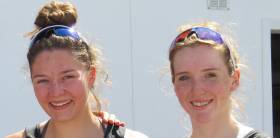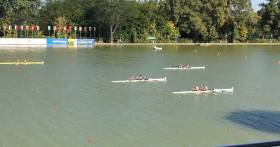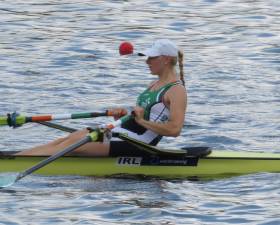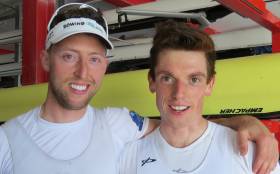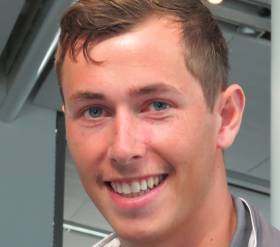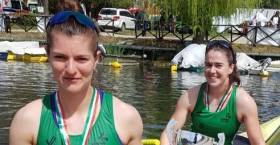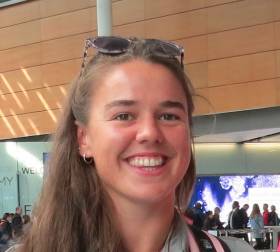Displaying items by tag: Monika Dukarska
Ireland Four Bound for World Cup Repechage in Poznan
#Rowing: The Ireland women’s four took fourth in their heat, missing out on direct qualification for the semi-final, at the World Cup Regatta in Poland this morning. The crew of Tara Hanlon, Monika Dukarska, Aileen Crowley and Emily Hegarty will compete in a repechage later today.
Australia and the United States Two fought it out for the win, with Australia taking top spot. Ireland and Britain battled for the third and final qualification spot, which Britain took.
World Cup Regatta, Poznan, Poland, Day One (Irish interest)
Women
Four
Heat One (First Three to A/B Semi-Finals; rest to Repechages): 1 Australia 6:32.50, 2 United States Two 6:33.57, 3 Britain 6:35.69; 4 Ireland (T Hanlon, M Dukarska, A Crowley, E Hegarty) 6:38.44.
Pair
Heat Two (Winner to A/B Semi-Final; rest to Repechages): 1 Italy Two 7:07.10; 2 China Two 7:09.55, 3 Ireland (E Lambe, C Feerick) 7:10.31.
Ireland Pair to Miss Europeans but Set For World Cup
#Rowing: Aifric Keogh has had to withdraw from the Ireland team for the European Championships at the end of the month because of illness. The Galway woman was to form a pair with Monika Dukarska in Lucerne (May 31st to June 2nd), but this crew will now travel to the second World Cup in Poznan, Poland on June 21st to 23rd. A women’s four will also be entered in Poznan, which was not originally pencilled in as an event for Ireland crews.
O'Driscoll and O'Donovan Trialled in a Four
#Rowing: An Ireland heavyweight four of Mark O’Donovan, Fionnan Crowley, Andy Harrington and Shane O’Driscoll got its first outing in the second session of the Ireland Trials on Saturday. Their test against Ronan Byrne and Philip Doyle – who did have a handicap of 15 seconds – ended with a victory for the double.
The pair of Monika Dukarska and Aifric Keogh got a battle from the junior double of Molly Curry and Rhiannon O’Donoghue, in a race won by lightweight single sculler Fintan McCarthy.
At the London Head of the River, provisional rankings placed Commercial’s senior eight 20th.
Dukarska and Crowley Win C Final at World Rowing
#Rowing: Ireland started the final day of the World Rowing Championships in Bulgaria in winning fashion. Monika Dukarska and Aileen Crowley dominated their C Final, winning by a length from Chile. This places the Ireland crew 13th in the world.
The strong winds prompted the organisers to redraw the lanes. The water was also visibly choppier than in recent days.
World Rowing Championships, Plovdiv, Bulgaria, Day Eight (Irish interest):
Women
Double Sculls – C Final (Places 13 to 18): 1 Ireland (M Dukarska, A Crowley) 6:54.55, 2 Chile 6:57.29, 3 Italy 6:58.17.
Puspure Dominates Heat at World Rowing Championships
#Rowing: Sanita Puspure punched in an outstanding performance as she won her heat of the single sculls at the World Rowing Championships in Plovdiv in Bulgaria. The Ireland sculler led off the start and gave her opponents no chance to challenge her for the one semi-final qualfication place on offer. She had a clearwater lead by 500 metres and eventually won by over 14 seconds from Fie-Udby Erichsen of Denmark.
Monika Dukarska and Aileen Crowley looked good in the early stages of their heat of the women’s double sculls, but the race got away from them in the second 1,000 metres and they finished sixth. Canada and Germany were clear leaders through the middle of the race and looked set to take the two qualification spots for the semi-finals. The Netherlands pushed up in the final third of the race and took out Germany, who dropped back to fourth.
World Rowing Championships, Plovdiv, Bulgaria, Day Two (Irish interest)
Men
Lightweight Quadruple Sculls – Heat Two (First to A Final; rest to Repechage): 1 Italy 5:48.03; 3 Ireland (F McCarthy, R Ballantine, J McCarthy, A Goff) 5:53.43.
Women
Double Sculls – Heat One (First Two to A/B Semi-Final; rest to Repechage): 1 Canada 6:54.02, 2 Netherlands 6:55.57; 6 Ireland (M Dukarska, A Crowley) 7:08.79.
Single Sculls – Heat One (Winner to A/B Semi-Finals; rest to Repechage): 1 Ireland (S Puspure) 7:25.78; 2 Denmark 7:39.93.
Irish Offshore Rowing Championships Set for Kerry
#Rowing: Portmagee Rowing club will host the Irish Offshore Rowing Championships on Saturday, September 8th. The event will be run by Rowing Ireland and the venue is O’Carroll’s Cove beach bar near Caherdaniel in County Kerry. This will be the first time this event will be held in Kerry.
More than 80 crews, made up of 220-plus oarsmen and women will compete for national titles. The event is the Fisa ranking event for the World Coastal Rowing Championships 2018 which will be held in Canada in October.
Kerry rowers have a good record in Coastal/Offshore Rowing. Ireland international Monika Dukarska, from the Killorglin Rowing Club, is a double world champion in the women’s single. Johnny Casey, whose grandfather was one of the legendary Caseys of Sneem, was the Irish men’s single champion last year.
This year’s course for the Offshore Championships is the same stretch of water that the Caseys, the "toughest family on earth", would have trained and raced on in the Seine boat during their heyday in the 1920s and 1930s. Johnny also teamed up with his brother James and uncle and father, Steve and Patrick, to win the All Ireland senior men’s four 20 years ago.
This year, the Courtmacsherry men’s quad crew who have defeated all comers over the last few years, put their title on the line. Waiting to take them on are the might of Muckross. Paul Griffin, an Ireland Olympian in Athens in 2004, when his Ireland lightweight four reached the A Final, and Beijing in 2008, is set to be in their ranks.
#Rowing: Mark O’Donovan and Shane O’Driscoll finished fourth in the semi-final of the men’s pair at the World Cup in Lucerne today. The Skibbereen men missed out on an A Final place, but not by much. Serbia won the race well, and three other boats – Spain, Britain One and Ireland – disputed the next two qualifying spots. They finished in that order, with Ireland just over three seconds behind Britain One.
Monika Dukarska and Aileen Crowley finished fourth in the semi-final of the women’s double and are also set for a B Final. The pair of Tara Hanlon and Aifric Keogh needed to take a top-two place in their repechage to make the A Final. They took fourth and will compete in the B Final.
World Cup Regatta, Lucerne, Day Two (Irish interest; selected results)
Men
Pair – A/B Semi-Final One (First Three to A Final; rest to B Final): 1 Serbia 6:33.87, 2 Spain 6:36.65, 3 Britain One 6:38.90; 4 Ireland (M O’Donovan, S O’Driscoll) 6:42.02.
D Final (Places 19 to 24): 1 Poland 6:40.95; 5 Ireland (P Boomer, A Harrington) 6:53.83.
Single Sculls – C Final (Places 13 to 18): 1 Australia 6:58.52, 2 Argentina 6:59.65, 3 Ireland (P Doyle) 7:00.39.
Women
Pair - Repechage (First Two to A Final; rest to B Final): 1 Australia 7:18.62, 2 China One 7:19.86; 4 Ireland (A Keogh, T Hanlon) 7:29.63.
Double – Semi-Final (First Three to A Final; rest to B Final): 1 New Zealand 6:53.91, 2 Canada 6:57.71, 3 Netherlands 6:58.57; 4 Ireland (A Crowley, M Dukarska) 7:06.42.
#Rowing: Three of the four Ireland boats in early action at the World Cup Regatta in Lucerne qualified directly from their heats and avoided repechage action.
Shane O’Driscoll and Mark O’Donovan took second place in their heat of the men’s pairs and secured a place in the quarter-finals. The world lightweight champions came up against the outstanding Sinkovic brothers from Croatia, who won the race with a sparkling performance. The key battle behind them was not to finish last. Brazil and Australia battled with Ireland, but O’Donovan and O’Driscoll moved away from both, collared second place and held on to it.
Patrick Boomer and Andy Harrington secured third place in their heat. Their qualification looked in doubt as they battled with Croatia at the back of the field. But the big Ireland crew found speed when they needed it. They produced the fastest final quarter, and left the Croats behind them. China faded badly and took the last place.
The women’s double of Monika Dukarska and Aileen Crowley qualified directly for the A/B Semi-Finals with a solid second place. The United States crew of Megan O’Leary and Ellen Tomek were convincing winners, while Dukarska and Crowley held on to second despite a late charge by China, who pushed Switzerland into the repechage.
In the women’s pair, the new crew of Aifric Keogh and Tara Hanlon finished sixth in their heat and are set for a repechage.
World Cup Regatta, Lucerne, Day One (Irish interest; selected results)
Men
Pair – Heat Two (First Four to Quarter-Final; rest to Quarter-Final or E Final): 1 Spain 6:40.29; 3 Ireland Two (P Boomer, P Harrington) 6:45.74
Heat Six (First Three to Quarter-Final; rest to Quarter-Final or E Final): 1 Croatia 6:37.66, 2 Ireland One (M O’Donovan, S O’Driscoll) 6:40.95.
Women
Pair – Heat Two (First to A Final; rest to Repechage): 1 Canada 7:13.98; 6 Ireland (A Keogh, T Hanlon) 7:32.49.
Double Sculls – Heat Two (First Three to A/B Semi-Finals; rest to Repechages): 1 United States 6:58.58, 2 Ireland (A Crowley, M Dukarska) 7:03.05.
#Rowing: Ireland’s women’s double scull of Aileen Crowley and Monika Dukarska qualified directly for the semi-finals of the World Cup in Belgrade this morning. They took the third of the three places of offer in their heat. The Netherlands won well and China One, who had led in the first quarter, took second. Dukarska and Crowley were third through most of the race but had just 3.4 seconds to spare over Switzerland at the finish line.
World Cup Regatta, Belgrade (Irish interest)
Men
Pair – Heat Four (Winner to A/B Semi-Finals; rest to repechage):
1 Czech Republic 6:41.22; 2 Spain 6:48.03, 3 China One 6:51.79, 4 Ireland (M O’Donovan, S O’Driscoll) 6:51.91.
Women
Pair – Heat One (First Three to A/B Semi-Finals; rest to repechage): 1 Britain One 7:19.05, 2 Britain Two 7:22.92, 3 Ireland (A Keogh, E Hegarty) 7:23.77.
Double Sculls – Heat Three (First Three to A/B Semi-Finals; rest to repechage): 1 Netherlands 7:10.90, 2 China One 7:16.89, 3 Ireland (A Crowley, M Dukarska) 7:20.40.
Puspure Wins Single Sculls Heat in Italy
#Rowing: Sanita Puspure won her heat of the single sculls at the Memorial Paolo d’Aloja regatta in Italy, qualifying for Saturday’s A Final. The Ireland sculler had over a second to spare over second-placed Milda Valciukaite of Lithuania, an Olympic bronze medallist in the double in 2016. Emily Hegarty and Aifric Keogh qualified for the A Final of the pair with third in their heat, while Monika Dukarska and Aileen Crowley won a three-boat exhibition race in the women’s double.


























